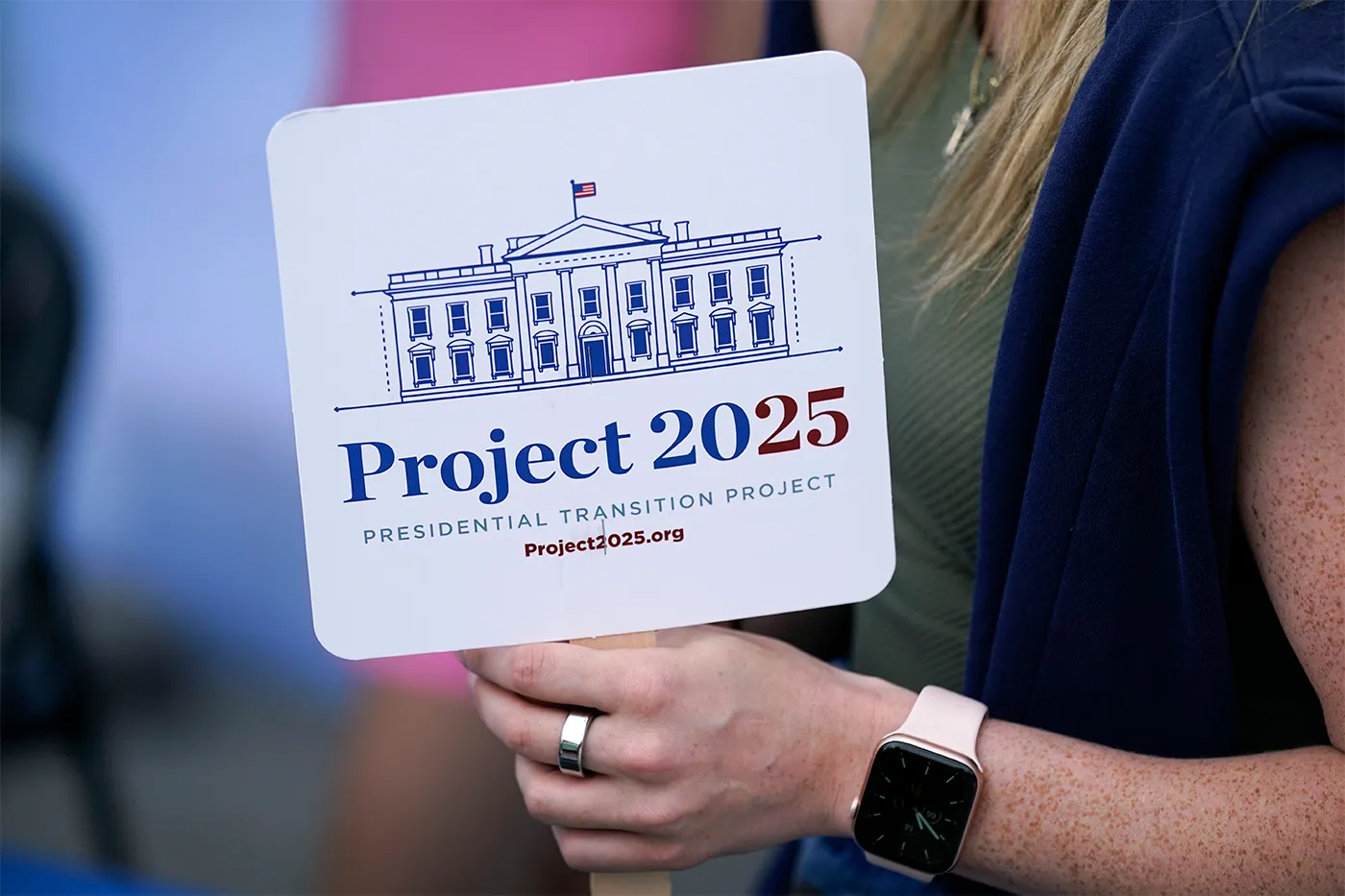What is project 2025?
Project 2025 is a A 922-page plan for sweeping changes in the federal government developed by the Heritage Foundation, a prominent conservative think tank in the United States. The project was published in April 2023 and is designed as a comprehensive plan for a potential conservative administration to implement upon taking office in January 2025, following the 2024 U.S. presidential election.
a
- Objective: Project 2025 aims to prepare a conservative administration with a detailed plan to restructure and reform the federal government. It covers a wide range of policy areas, including the economy, healthcare, education, immigration, national security, and more.
- Blueprint for Governance: The project serves as a blueprint that outlines policy recommendations, strategies for implementing these policies, and proposals for reorganizing government agencies to align with conservative principles. It focuses on reducing the size of the federal government, rolling back regulations, and enhancing executive power.
- Team Building: One of the key components of Project 2025 is the preparation of a conservative talent pool that can be tapped to fill key positions in the federal government. This includes the identification and vetting of potential appointees who share the project’s ideological commitments.
When was it Published?
- Project 2025 was published in April 2023 by the Heritage Foundation. The timing of its release was strategic, aimed at influencing the 2024 presidential election and ensuring that a conservative administration would be ready to govern effectively from day one.
What is the Heritage Foundation and how it takes place in policy-making?
The Heritage Foundation is a conservative think tank based in Washington, D.C., founded in 1973. It is one of the most influential organizations in shaping U.S. conservative policy, particularly within the Republican Party.
a
Overview of the Heritage Foundation
- Mission: The Heritage Foundation’s mission is to promote public policies based on the principles of free enterprise, limited government, individual freedom, traditional American values, and a strong national defense.
- Research and Advocacy: The foundation conducts research and analysis on a wide range of issues, including economics, health care, foreign policy, education, and more. It publishes reports, policy briefs, and articles that advocate for conservative solutions to these issues.
Role in Policy-Making
The Heritage Foundation plays a significant role in U.S. policy-making through several mechanisms:
a
- Policy Development:
- Research and Reports: The Heritage Foundation produces detailed policy research and analysis. These reports often serve as the basis for legislative proposals and policy decisions. Lawmakers and government officials frequently use Heritage’s research as a reference when drafting bills or executive orders.
- Policy Recommendations: The foundation provides specific policy recommendations that align with conservative values. These recommendations are disseminated to policymakers, media, and the public to influence the direction of government policy.
- Advising Policymakers:
- Consultation: Heritage Foundation experts regularly consult with lawmakers, government officials, and political candidates. They provide advice on crafting legislation, shaping regulatory policy, and developing political strategies.
- Testimony: Heritage Foundation scholars are often called to testify before Congress on various issues, providing expert opinions that can shape the legislative process.
- Public Advocacy:
- Media Presence: The foundation uses media, both traditional and digital, to advocate for its policy positions. By shaping public opinion, it indirectly influences policymakers who are sensitive to the views of their constituents.
- Educational Outreach: Heritage conducts programs aimed at educating the public, policymakers, and future leaders about conservative principles. This includes hosting events, publishing educational materials, and engaging in outreach to schools and universities.
- Staffing Government:
- Influence in Appointments: The Heritage Foundation plays a role in identifying and recommending individuals for key positions in the federal government, particularly when a Republican administration is in power. Many former Heritage staffers have gone on to hold significant roles in government.
- Project 2025: An example of this is Project 2025, where the foundation has prepared a list of vetted conservative candidates ready to be appointed to federal positions if a conservative candidate wins the presidency in 2024.
- Think Tank Network:
- Coalition Building: Heritage collaborates with other conservative think tanks, advocacy groups, and grassroots organizations to build a cohesive conservative policy agenda. This network amplifies its influence across different levels of government and society.
Impact on Policy-Making
The Heritage Foundation has been particularly effective in shaping the policy agenda during Republican administrations. For example:
- Reagan Administration: The foundation’s policy document, “Mandate for Leadership,” heavily influenced Ronald Reagan’s policy agenda in the 1980s.
- Trump Administration: Heritage provided a significant number of policy recommendations, many of which were implemented, and a large number of former Heritage staffers were appointed to key positions.
Is Project 2025 Trump’s plan?
Project 2025 is not specifically Donald Trump’s plan since he stated on his social media that he knew nothing about “Project 2025” and was not aware of who was behind the 922-page plan, which can seem puzzling since he is close with project 2025`s director Paul Dans.
Noting that some of the proposals put forward within the framework of the plan are “absolutely ridiculous and terrible,” Trump said, “I wish them luck whatever they do, but I have nothing to do with them.”
But it is designed to serve any conservative administration that might take office after the 2024 U.S. presidential election, including one led by Trump if he were to win.
While Trump could potentially adopt many of the ideas and recommendations in Project 2025 if he were to return to the presidency, the plan is broader than just one individual and is intended to guide any conservative leader who aligns with its goals.
a
How will it effect social security and fundamental human rights?
Project 2025’s proposals could have significant implications for Social Security and fundamental human rights:
a
Social Security:
- Tax Changes:
- The project suggests changing tax rates and removing most deductions and credits. While it doesn’t directly propose changes to Social Security, shifts in tax policy could impact the funding and sustainability of Social Security by altering revenue streams or priorities.
- Federal Reserve Reform:
- The proposed reforms to the Federal Reserve, such as potentially returning to the gold standard, could affect economic stability and inflation, which in turn could influence Social Security benefits. Economic instability might impact the trust funds that support Social Security.
Fundamental Human Rights:
- Transgender Rights:
- The project’s proposals to roll back protections for transgender individuals, such as reinstating the military ban and restricting gender-affirming care, would directly affect the rights and well-being of transgender people. This could lead to increased discrimination and reduced access to healthcare and other services.
- DEI and LGBTQ Rights:
- Eliminating DEI programs and restricting protections for LGBTQ individuals could undermine efforts to promote equality and inclusivity. It might lead to greater discrimination and reduce the legal protections available to LGBTQ people.
- Abortion Rights:
- While not calling for an outright ban, the measures to restrict abortion access could significantly limit reproductive rights and healthcare options for women, impacting their autonomy and access to necessary medical services.
- Education:
- The push for school choice and banning certain educational content could affect students’ access to comprehensive education and limit exposure to diverse perspectives, potentially impacting their right to a well-rounded education.
- Big Tech and Media:
- Changes to tech regulation and Section 230 could affect freedom of expression online. By allowing states to impose laws on social media platforms, there might be varying degrees of freedom of speech and increased censorship or control over online content.
Overall, Project 2025’s policies could reshape social and legal landscapes in ways that might limit certain rights and alter how social programs are funded and managed. The actual impact would depend on how these proposals are implemented and whether they face legal or legislative challenges.
a
For more on Project 2025 you can check >
The document> https://static.project2025.org/2025_MandateForLeadership_FULL.pdf
Website>https://www.project2025.org

